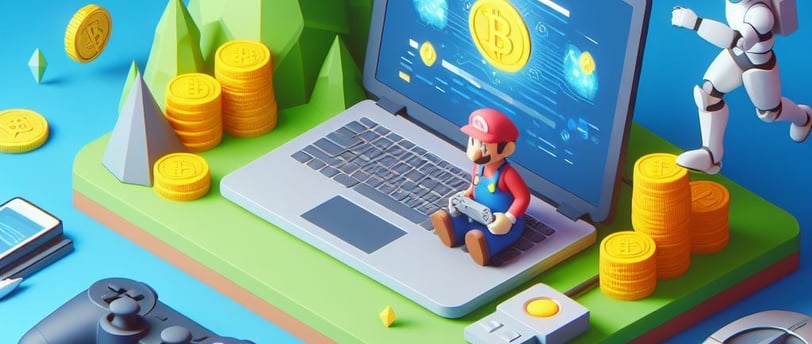The Transformative Role of Cryptocurrency in Gaming


In recent years, the world of gaming has witnessed a significant transformation with the emergence of cryptocurrencies. These digital currencies have revolutionized the way in-game economies function, offering secure and transparent transactions, and providing new opportunities for developers and players to monetize and engage. In this article, we will delve into the role of cryptocurrency in gaming, exploring the benefits they bring to online gaming platforms, their influence on game design, and their impact on player communities.
The Reshaping of In-Game Economies
One of the key ways in which cryptocurrencies have made an impact on gaming is by reshaping in-game economies. Traditionally, in-game currencies were limited to the specific game or platform, making it difficult for players to transfer their virtual assets or trade them for real-world value. However, with the advent of cryptocurrencies, players now have the ability to trade their in-game assets for digital currencies that can be exchanged for real money.
This has opened up a whole new world of possibilities for players, as they can now earn a living through gaming. Skilled players who accumulate rare or valuable in-game items can sell them on cryptocurrency exchanges, allowing them to monetize their gaming skills. This has created a new breed of professional gamers who earn a substantial income by participating in tournaments, streaming their gameplay, and trading virtual assets.
Secure and Transparent Transactions
Cryptocurrencies offer a level of security and transparency that traditional payment methods cannot match. In-game transactions conducted through cryptocurrencies are encrypted and decentralized, making them highly secure and resistant to fraud. This is particularly important in the gaming world, where virtual assets can hold significant value.
Furthermore, the use of cryptocurrencies eliminates the need for intermediaries such as banks or payment processors, reducing transaction fees and increasing the speed of transactions. Players can now buy, sell, and trade virtual assets directly with one another, without the need for a third party to facilitate the transaction. This not only makes the process more efficient but also ensures that the value of the assets is determined solely by the market, rather than being subject to the control of a central authority.
New Opportunities for Monetization and Engagement
Cryptocurrencies have opened up new avenues for developers and players to monetize and engage with games. Developers can create in-game economies that are powered by cryptocurrencies, allowing players to earn rewards and virtual assets that hold real-world value. This incentivizes players to spend more time and money within the game, driving engagement and increasing revenue for developers.
Additionally, developers can implement blockchain-based systems that enable players to own and trade their in-game assets outside of the game environment. This means that players have true ownership of their virtual assets, and they can freely transfer them between different games or platforms. This interoperability between games not only gives players more control over their virtual assets but also encourages collaboration and cross-platform play.
Influence on Game Design and Player Communities
The introduction of cryptocurrencies has had a profound influence on game design and player communities. Game developers are now designing games with built-in economies that utilize cryptocurrencies, creating a new level of immersion and realism. Players can earn, spend, and trade virtual assets within the game, mirroring the real-world economy.
Furthermore, the use of cryptocurrencies has fostered the growth of player communities. Cryptocurrency enthusiasts and gamers alike come together to discuss and trade virtual assets, forming tight-knit communities that extend beyond the boundaries of the game. These communities provide a platform for players to share strategies, collaborate, and even organize their own tournaments or events.
The Impact of Blockchain Technology
Blockchain technology, the underlying technology behind cryptocurrencies, has also played a significant role in gaming innovations. The decentralized nature of blockchain allows for the creation of trustless systems, where players can verify the authenticity and ownership of virtual assets without the need for a central authority.
Blockchain technology also enables the creation of non-fungible tokens (NFTs), which are unique digital assets that can represent anything from in-game items to virtual real estate. NFTs have gained popularity in the gaming world, as they provide players with true ownership and the ability to trade their assets on blockchain-based marketplaces.
The Future of Digital Entertainment
The integration of cryptocurrencies and blockchain technology into the gaming industry has paved the way for the future of digital entertainment. As more players embrace cryptocurrencies and the concept of true asset ownership, we can expect to see further innovations in game design, player engagement, and the creation of virtual economies.
With the increasing popularity of cryptocurrencies and the growing acceptance of blockchain technology, the gaming industry is poised for a revolution. The transformative role of cryptocurrency in gaming is not just limited to financial transactions but extends to the very fabric of the gaming experience itself. As players continue to explore the possibilities offered by cryptocurrencies, we can only imagine the exciting developments that lie ahead in the world of gaming.
